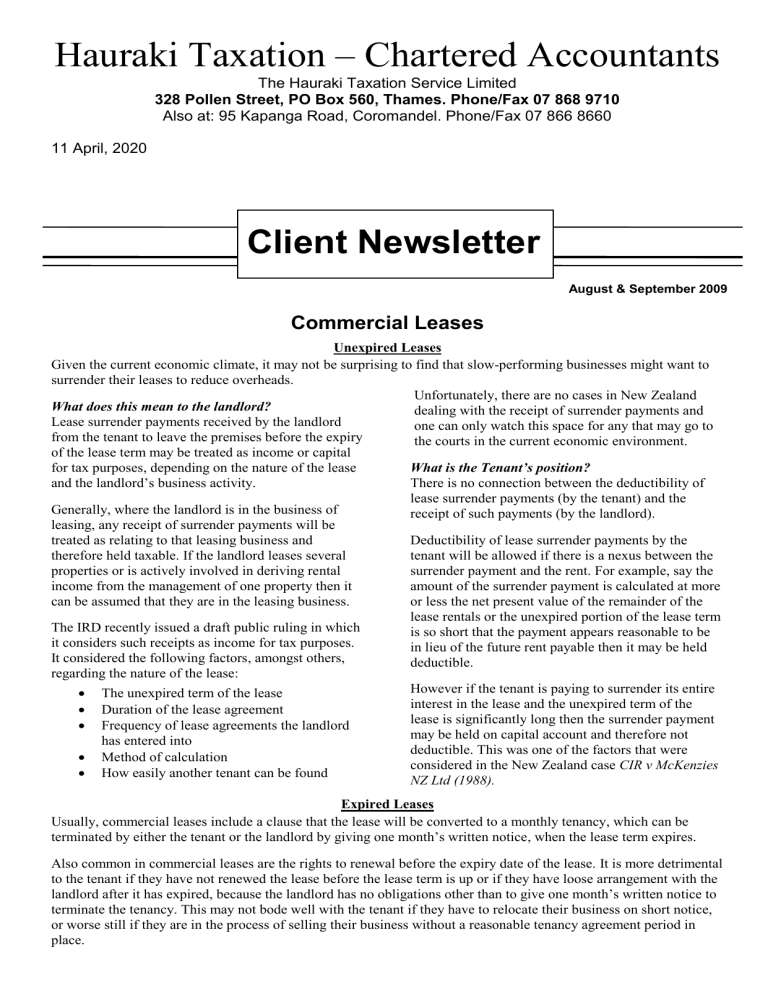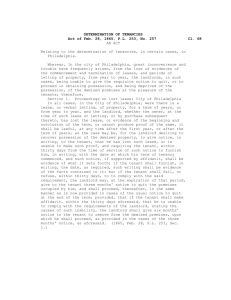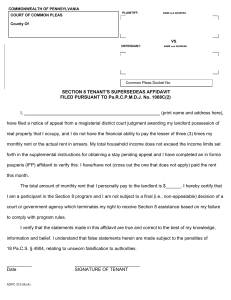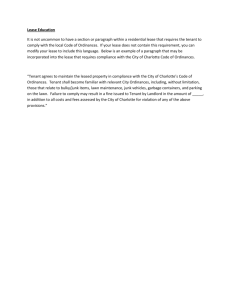Client Newsletter - The Hauraki Taxation Service Limited

Hauraki Taxation – Chartered Accountants
The Hauraki Taxation Service Limited
328 Pollen Street, PO Box 560, Thames. Phone/Fax 07 868 9710
Also at: 95 Kapanga Road, Coromandel. Phone/Fax 07 866 8660
11 April, 2020
Client Newsletter
August & September 2009
Commercial Leases
Unexpired Leases
Given the current economic climate, it may not be surprising to find that slow-performing businesses might want to surrender their leases to reduce overheads.
What does this mean to the landlord?
Lease surrender payments received by the landlord
Unfortunately, there are no cases in New Zealand dealing with the receipt of surrender payments and from the tenant to leave the premises before the expiry of the lease term may be treated as income or capital one can only watch this space for any that may go to the courts in the current economic environment.
for tax purposes, depending on the nature of the lease and the landlord’s business activity.
What is the Tenant’s position?
There is no connection between the deductibility of
Generally, where the landlord is in the business of leasing, any receipt of surrender payments will be lease surrender payments (by the tenant) and the receipt of such payments (by the landlord). treated as relating to that leasing business and therefore held taxable. If the landlord leases several properties or is actively involved in deriving rental income from the management of one property then it can be assumed that they are in the leasing business.
The IRD recently issued a draft public ruling in which
Deductibility of lease surrender payments by the tenant will be allowed if there is a nexus between the surrender payment and the rent. For example, say the amount of the surrender payment is calculated at more or less the net present value of the remainder of the lease rentals or the unexpired portion of the lease term is so short that the payment appears reasonable to be it considers such receipts as income for tax purposes.
It considered the following factors, amongst others, regarding the nature of the lease:
The unexpired term of the lease
Duration of the lease agreement
Frequency of lease agreements the landlord has entered into
Method of calculation
How easily another tenant can be found in lieu of the future rent payable then it may be held deductible.
However if the tenant is paying to surrender its entire interest in the lease and the unexpired term of the lease is significantly long then the surrender payment may be held on capital account and therefore not deductible. This was one of the factors that were considered in the New Zealand case CIR v McKenzies
NZ Ltd (1988).
Expired Leases
Usually, commercial leases include a clause that the lease will be converted to a monthly tenancy, which can be terminated by either the tenant or the landlord by giving one month’s written notice, when the lease term expires.
Also common in commercial leases are the rights to renewal before the expiry date of the lease. It is more detrimental to the tenant if they have not renewed the lease before the lease term is up or if they have loose arrangement with the landlord after it has expired, because the landlord has no obligations other than to give one month’s written notice to terminate the tenancy. This may not bode well with the tenant if they have to relocate their business on short notice, or worse still if they are in the process of selling their business without a reasonable tenancy agreement period in place.
Existing Leases
With the current recessionary times we are in, tenants should be careful of ratchet clauses included in commercial leases by the landlord.
Simply put, the ratchet clause states that the rent will not be less than the current rental when it comes up for review on the renewal date.
It is possible that the tenant may not be able to sustain the high rent if the market rent has dropped at the time of the rent review. In such circumstances, the landlord may decide to reduce the rent in order to keep the premises occupied.
However, if the parties have used an ADLS lease agreement (produced by the Auckland District Law Society and a commonly used form) then the landlord needs to be wary of the amendments made to the agreement over the years to reflect fairness to both parties using it.
The ratchet clause in the ADLS form has been amended to state that the rent will not be less than the rent at the commencement of the “current lease term” – effectively stating that the rent will not be less than the last review date. In the case where the landlord had reduced the rent at the previous review date, the landlord may find it difficult to negotiate the rent back to the original amount, especially if the increase from the last review date is substantial.
Employment Law
An amendment to the employment legislation was introduced by the government effective from 1 March 2009 for small businesses. The amendment allows employers to dismiss new staff within the first 90 days of employment without the risk of the employee lodging a personal grievance case against the employer.
Why has this 90-day trial period been introduced?
Before the amendment, employers carried most of the risks associated with employment issues if the employment relationship did not work out. For example, the employer may suffer losses by not generating business productivity at its optimum because of an incorrect fit of an employee. If, on the other hand, the employer terminated the employment contract they risked legal action and thus face financial costs for unjustified dismissal of that employee.
The amendment aims to achieve the following:
Encourage employers to provide employment opportunities to people without the financial risk to the employer if the employment relationship does not work out;
Afford increased work opportunities in which employees can prove themselves, especially for those on the margins of the labour market; and
Allow employers to hire more people in this recessionary period by letting them test their labour capacity without the legal constraints.
Any Snags in the Legislation?
With any piece of legislation that is enacted, it is never as simple as it was intended to be. The following conditions have to be present for the legislation to apply:
Only those employers with “fewer than 20 employees” can use the 90 day probationary period.
Employers must have a written provision of the trial period in the Employment Agreement.
The trial period can be of a shorter duration but cannot exceed 90 days.
The employer can terminate the employment by giving notice without the obligation to disclose his reasons for the termination in a statement.
As seen above there can be issues arising from the amendment, for example:
A headcount for the 20 staff employed may include 2 or more part-time workers on the same job; or
The commencement date of the 90-day trial period may not be clear, as many small businesses employ staff who start work before signing the Employment Contract; or
Often small businesses have only oral agreements with some staff.
Important: This is not advice. Clients should not act solely on the basis of the material contained in the Client Newsletter . Items herein are general comments only and do not constitute or convey advice per se. Changes in legislation may occur quickly. We therefore recommend that our formal advice be sought before acting in any of the areas. The Client Newsletter is issued as a helpful guide to clients and for their private information. Therefore it should be regarded as confidential and should not be made available to any person without our prior approval. The Hauraki Taxation Service Limited. 184/09.




